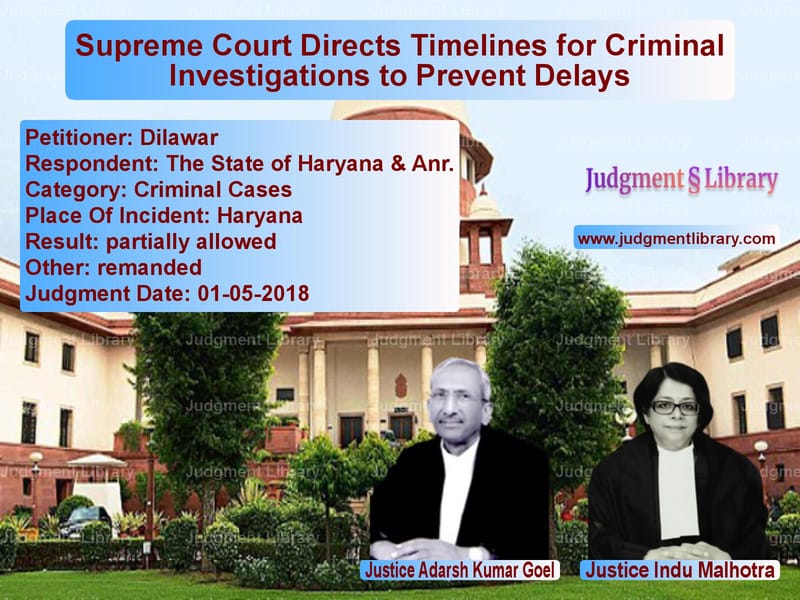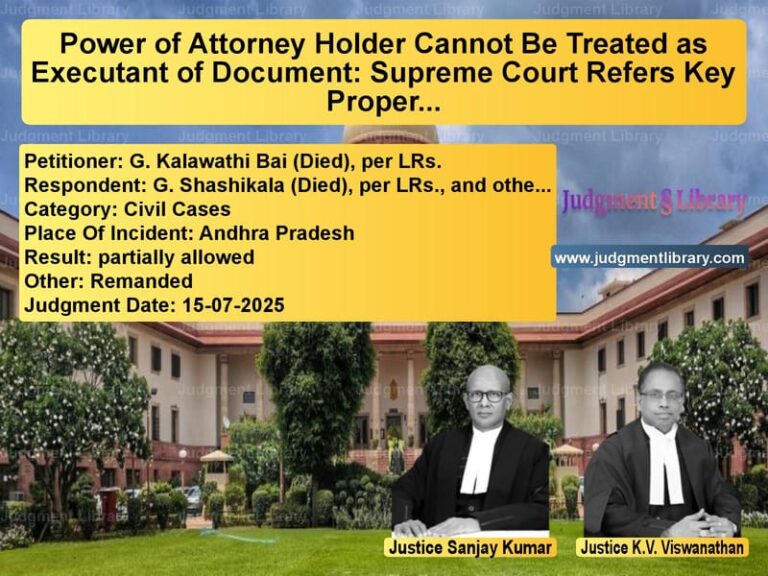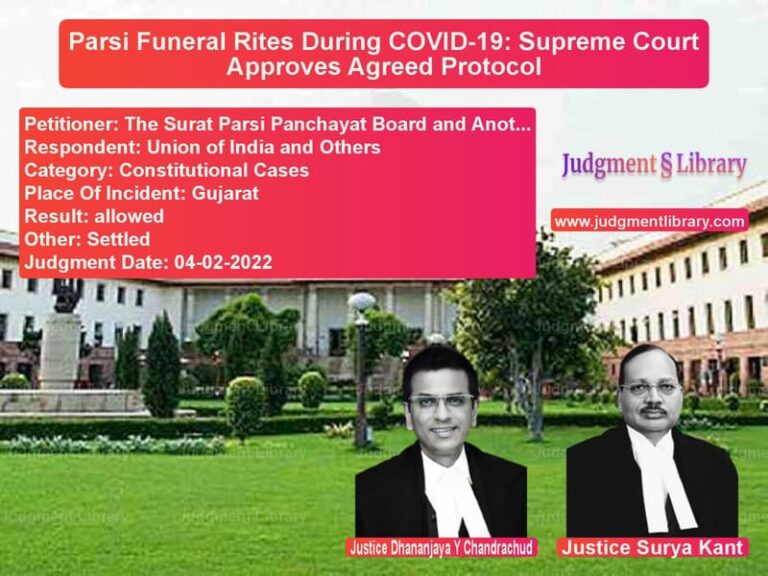Supreme Court Directs Timelines for Criminal Investigations to Prevent Delays
The case of Dilawar vs. The State of Haryana & Anr. revolves around the issue of prolonged criminal investigations and the delays in concluding trials. The Supreme Court had to determine whether investigations could be left pending indefinitely and what guidelines should be set to ensure timely justice.
Background of the Case
The petitioner, Dilawar, was arrested in connection with FIR No. 118 dated February 27, 2016, which alleged mob violence during the Jat agitation. He was taken into custody on April 20, 2016, and the state police completed its investigation, filing a chargesheet on May 27, 2016. However, on September 30, 2016, the investigation was transferred to the Central Bureau of Investigation (CBI), along with several other cases.
After the case was moved to the CBI, the petitioner’s bail application was rejected by both the Additional Sessions Judge, Rohtak, and the Punjab & Haryana High Court. The High Court observed that he was allegedly one of the leaders of the mob involved in arson, loot, and the burning of a Cabinet Minister’s house. His bail was further declined by the Supreme Court on January 31, 2017, with the direction that the trial be concluded within six months.
Arguments by the Petitioner (Dilawar)
The petitioner contended that:
- He had been in custody for over two years without trial.
- The CBI had delayed the investigation without any justification.
- The case should not remain indefinitely pending, as it violated his fundamental right to a speedy trial under Article 21 of the Constitution.
- Several co-accused were already granted bail by the High Court, and his continued detention was unjust.
Arguments by the Respondents (CBI & State of Haryana)
The CBI countered:
- It had taken over the investigation only on October 6, 2016, and required more time due to the complexity of the case.
- The case involved mob violence, which made identifying culprits difficult.
- There was a voluminous amount of evidence to be examined.
- The investigation was being conducted in a fair and impartial manner and would be completed soon.
Supreme Court’s Observations
The Supreme Court, comprising Justice Adarsh Kumar Goel and Justice Indu Malhotra, expressed concerns over the undue delay in completing investigations.
1. Delay in Investigation is a Violation of Fundamental Rights
The Court held that prolonged investigations without justification violated an accused’s fundamental right to a speedy trial under Article 21 of the Constitution.
“Speedy investigation is recognized as a part of the fundamental right of fair procedure under Article 21.”
2. Accountability for Delays in Criminal Investigations
The Court found that investigative agencies often delay cases unnecessarily, leading to prolonged detentions.
“No investigating agency can take unduly long time in completing investigation. Such delays are not conducive to the administration of criminal justice.”
3. Timelines for Investigation
The Court directed the CBI to complete its investigation within two months and commence the trial by July 10, 2018, ensuring its conclusion by the end of the year.
“Since the accused has been in custody for more than two years and the investigation is pending for over one and a half years, the CBI must complete its investigation within the next two months.”
4. Right to Apply for Bail
The Court also ruled that since more than one year had passed since the bail was denied, the petitioner could file a fresh bail application before the trial court.
Need for Institutional Reforms
The Supreme Court took cognizance of the systemic delays in investigations across India and proposed an in-house oversight mechanism for investigative agencies.
1. Systemic Delays in Investigation
The Court observed:
“There is a need for timelines for completing investigations. The obligation flows from the law laid down by this Court in cases such as Maneka Gandhi vs. Union of India and Hussainara Khatoon vs. State of Bihar.”
2. Proposed Institutional Reforms
The Court directed the Ministry of Home Affairs (MHA) to:
- Hold discussions with all Central and State investigative agencies by May 31, 2018.
- Constitute a committee to examine systemic delays and propose timelines.
- Submit a report by June 30, 2018 with an action plan for completing pending investigations.
Final Judgment
The Supreme Court ruled:
- The CBI must complete the investigation within two months.
- The trial must commence by July 10, 2018 and conclude by the end of the year.
- The petitioner may file for bail in accordance with the law.
- The Ministry of Home Affairs must review delays in criminal investigations and propose systemic reforms.
The Court concluded:
“There must be accountability for investigating agencies to ensure the timely completion of criminal investigations. A structured mechanism is required to address delays.”
Implications of the Judgment
1. Strengthening the Right to a Speedy Trial
The ruling ensures that investigations are completed on time, preventing prolonged detentions.
2. Holding Investigative Agencies Accountable
The directive for systemic reforms introduces accountability mechanisms for investigating agencies.
3. Protecting Accused Persons’ Rights
The judgment affirms that an accused person should not remain in custody indefinitely due to slow investigations.
4. Institutionalizing Investigation Timelines
The Court’s directive to the MHA ensures a structured approach to addressing delays in criminal investigations.
Conclusion
The Supreme Court’s ruling in Dilawar vs. The State of Haryana is a landmark judgment ensuring the timely completion of investigations. By directing the CBI to conclude its probe within two months and instructing the MHA to propose systemic reforms, the Court has reinforced the fundamental right to a speedy trial.
This judgment is expected to bring accountability to investigative agencies and ensure that criminal investigations are conducted efficiently and fairly.
Petitioner Name: Dilawar.Respondent Name: The State of Haryana & Anr..Judgment By: Justice Adarsh Kumar Goel, Justice Indu Malhotra.Place Of Incident: Haryana.Judgment Date: 01-05-2018.
Don’t miss out on the full details! Download the complete judgment in PDF format below and gain valuable insights instantly!
Download Judgment: Dilawar vs The State of Haryana Supreme Court of India Judgment Dated 01-05-2018.pdf
Direct Downlaod Judgment: Direct downlaod this Judgment
See all petitions in Bail and Anticipatory Bail
See all petitions in Custodial Deaths and Police Misconduct
See all petitions in Public Interest Litigation
See all petitions in Judgment by Adarsh Kumar Goel
See all petitions in Judgment by Indu Malhotra
See all petitions in partially allowed
See all petitions in Remanded
See all petitions in supreme court of India judgments May 2018
See all petitions in 2018 judgments
See all posts in Criminal Cases Category
See all allowed petitions in Criminal Cases Category
See all Dismissed petitions in Criminal Cases Category
See all partially allowed petitions in Criminal Cases Category







